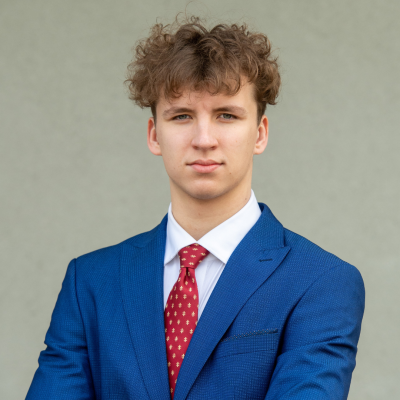
Dominykas Nedzinskas
IIRPS VU student
How did you choose to study at IIRPS VU? Which subjects do you like most?
– To be honest, I chose to study at IIRPS VU by process of rejection. I looked at the courses offered at the university and rejected what was less attractive. And so it turned out that political science was closest to my heart. The reputation of IIRPS VU in the public sphere, its well-known lecturers, and the wide range of courses were also tempting. IIRPS VU also offered me the study content and curriculum I was interested in and an attractive academic environment. In the Institute itself, I am most excited about the security and Asia-Pacific studies.
You are currently working at the Eastern European Studies Centre; how are you enjoying it? Do you have to apply the theoretical knowledge acquired at IIRPS?
– I have been working at the Eastern European Studies Centre for half a year, so I have already settled into the Centre’s activities well and am working at full capacity. I see my work at the EESC (Eastern European Studies Centre) in a really positive light because I feel that I am contributing to the quality of the work I do, and at the same time, I am growing my own competencies and skills. The theoretical knowledge acquired at the IIRPS VU has to be applied on a regular basis – when interacting with the guests at the event, when thinking about future projects and research, when reading/contributing to the development/writing of analytical publications, etc. Basically, the whole life of the EESC revolves around politics, so without specific, let alone basic, knowledge, it would be extremely difficult to fit in and contribute to the Centre. However, it is not only the theoretical knowledge acquired at IIRPS VU that helps you to work at the EESC, but also the work ethic, the culture of communication, acquaintances and friendships. Sometimes we don’t realise how many skills and competencies we acquire at university – how we learn to communicate and behave formally, to analyse, and to work.
You contributed to the organisation of the NATO Public Forum; could you share your experiences? What are the most memorable moments of the preparation process and the event itself?
– The NATO Public Forum and the NATO Summit are probably the biggest security events in the history of Lithuania. Needless to say, organising such an event brings enormous pleasure and a sense of pride. However, we have always referred to the preparation and organisation of the event as a marathon. My colleagues have been preparing for this event for 2 years, working every day for a flawless two-day event. From the outside, this preparation period may seem a little incomprehensible, but when I joined the team, I realised the complexity of the event we were facing. Hundreds of world-class experts, leaders in their fields, renowned academics, defence ministers and heads of state are eager to fly in and out within hours. It probably goes without saying that, as always, unforeseen events have occurred, and the need for transport has been ever-changing and dynamic. There were, of course, also enormous security requirements, so that even the smallest item could take weeks or even months to arrive, to be approved, etc. Procurement procedures, communication with partners, construction, cooperation with NATO, and co-organised events abroad – all required enormous efforts and long working hours. From a personal perspective, I would call the organisation of such an event a marathon that needs to be sprinted. However, I am extremely happy that I had the opportunity to organise this event with the team of the Centre for East European Studies. My colleagues have shown extraordinary persistence, professionalism and friendliness in working on the event implementation. We all had to go through personal exhaustion, but even under such circumstances, we helped each other and kept the EESC as a place we wanted to return to. So I would say that the most memorable moments of the preparation process were the whole 3 weeks before the event when my colleagues and I gathered in one room in the office and spent days together there. There we created Excel sheets with 100 formulas, ran the accreditation process, bought hundreds of tickets, communicated with our partners, we laughed, we were sad, and we ate pizza :). The most memorable moments of the event would be the interaction with the NATO Office Of Security (NOS), meeting Andrii Yermak and celebrating with the team after the event. Because of the intense workload during the whole event, the event itself flew by in a flash, and now it’s hard to say what was the most memorable part of the event because it was truly memorable.
How do you spend your free time after studying, working and volunteering?
– I really like to play chess, but I’m pretty bad at it so far, so when I lose, I like to vent my negative emotions by bouldering, swimming, cycling and running. I like almost all physical activities, and besides chess, reading books helps me relax. Basically, any vigorous physical activity helps to reduce psychological pressure.
What would you like to wish the IIRPS VU community?
– The IIRPS VU community is, in my eyes, a community of civic, active and intelligent people, and I very much hope that everyone will continue to have the drive and desire to change things for the better.







